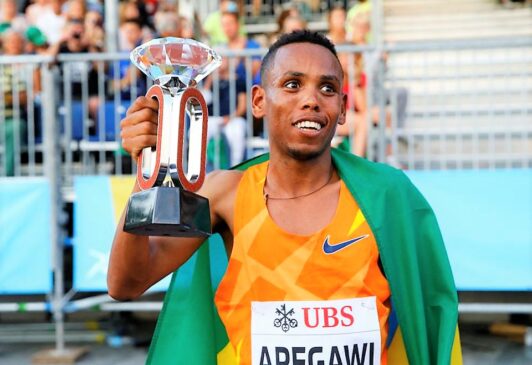After beating Rudisha, Ethiopian teenager Aman now confident of writing his own history

Addis Ababa, Ethiopia – Surely, you have read this story before.
A young Ethiopian born in the rural countryside of this topographically-diverse nation watches one of the country’s legion of long distance running heroes to take up the sport in athletics. Driven by the motivation to make it to the very top and change his and her family’s fortunes through race winnings, this runner trains long and hard. Eventually, this runner makes it to the very top winning races around the world, titles in major championships, and hard-earned cash that transforms the life of his or her family.
However, Ethiopian 800m record holder Mohammed Aman’s story is so different from the typical Ethiopian athletics rags to riches tale that he might as well have joined hundreds of his compatriots in realms of obscurity.
Instead, the 17-year old is just ending an outstanding breakout year where he won 800m silver at the IAAF World Youth Championships in Lille, France; reached the final of the 800m at the World Championships in Daegu, South Korea; improved the seven-year Ethiopian national record over the event to 1:43.37; and then caused the mother of all surprises when beating Kenyan World champion and world record holder David Rudisha in a tight race in Milan.
The two-time African junior champion says he is contributing to dismissing the myth that Ethiopians cannot excel over the short and middle distance events. “I believe that these beliefs are a long term wrong perception,†he says. “If we work hard, we can get better results in short and middle distance events too. There are a lots of youngsters with the talent, we just need hard work.â€Â
No farm work, athletics in school
Part of the myth that Ethiopians can only exceed in long distance events is enshrined into how many of the country’s top athletes start athletics. Much like distance running legend Haile Gebrselassie, Aman was born in Assela, 223kms southeast of the capital Addis Ababa.

But unlike Gebrselassie and other top distance runners, Aman did not go through a rural upbringing of helping his parents on the farm, running long distances to a nearby water source to fetch water, or endure long trips to school on foot every day. “I have five sisters and two brothers and I am the fifth child of eight,†says Aman of his upbringing. “My father was a teacher, but now works in a government office. My mom is a house wife. I went to school in Assela which was near our house and did not need to run to school every day.â€Â
Instead, he started athletics in school and then later joined a youth development project supported by the Ethiopian Athletics Federation (EAF) in Assela in 2007. “There is a project in Assela set up by EAF and friends from our neighborhood told me that they are registered to take part and urged me to do it,†he says. “I followed their advice and registered, but kept my concentration on academics.â€Â
Like other hopefuls, Aman would grace the dusty track at the Green Flood stadium in Assela every day, but knew from the onset that he wanted to concentrate in the middle distance events. “We all lived with our families and trained when our school shifts were over,†he says. “It was a good way to combine school and athletics. We had some difficulties with getting the proper training shoes and sufficient diet to replace what we would expend during our training. There were many talented runners in the project, but some of then left later to focus fully on their school.â€Â
For Aman, however, the rise to the top was rapid. Less than a year after he joined the project, he was selected to represent his project in the Oromiya regional championships where he won a 400m/800m double. He made his international debut in Abuja, Nigeria where he ran an encouraging 1:50.29.
His first taste of glory came at the 2009 African Junior Championships in Bambous, Mauritius when he took victory in 1:48.82, an Ethiopian junior record. Read Full Story on IAAF.org



